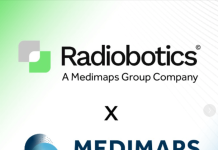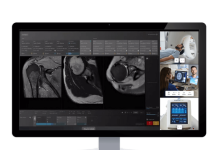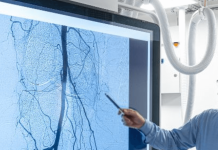There’s no shortage of artificial intelligence algorithms that have been trained to pick up on a wide variety of diseases and other health conditions—from heart disease to stroke to pulmonary embolism—by looking only at standard imaging data.
One AI tool, for example, was cleared by the FDA in 2018 with an aim of detecting early signs of diabetic retinopathy in photos of the eye captured using retinal cameras. Developed by Digital Diagnostics, it was the first such algorithm to earn the agency’s blessing.
Years later, the technology’s promise is still ringing true to partners and investors alike. Not long after forging a partnership with Baxter earlier this year, Digital Diagnostics has roped in $75 million in series B funding to build out the reach of IDx-DR and its other AI-powered diagnostic tools.
The financing round follows Digital Diagnostics’ series A, which closed in 2018 with $33 million. To date, the Iowa-based company said it has raised more than $130 million since its 2010 founding—when it was known as IDx.
New York-based KKR led the round and will send Ali Satvat, its global head of healthcare strategic growth and a KKR partner, to Digital Diagnostics’ board of directors. Other new and existing investors also joined the round, including Kinderhook, 8VC, Optum Ventures, OSF Ventures, Gundersen Lutheran, Edward-Elmhurst Health Venture Capital, the University of Iowa and Cedar Pine, the last of which will also send a representative to the board: Stephen Weiss, managing director of the investment firm.
With the series B boost, Digital Diagnostics said it would expand its current distribution footprint and accelerate the development of its products while also investing in sales and marketing to reach more patients and providers.
RELATED: Xtant Medical Announces $9.75 Million Private Investment
IDx-DR takes in images captured using fundus cameras. In the span of about 30 seconds, it analyzes each photo for early signs of diabetic retinopathy—a condition that occurs in people with diabetes and can lead to vision loss or blindness—as well as macular edema, a serious complication of the condition.
A primary goal of the simplified diagnostic system is to improve screening for diabetic retinopathy, since estimates show that only about half of all diabetes patients visit an eye specialist for the recommended annual screenings.
The FDA’s de novo clearance of the AI technology allowed it to be used only on images captured by the NW400 retinal camera from Tokyo-based Topcon. The deal that Digital Diagnostics signed with Baxter in March, however, aims to expand that indication to include the RetinaVue 700 Imager that Baxter added to its portfolio in its blockbuster acquisition of Hillrom, parent company of the camera’s maker, Welch Allyn. At the time, the new partners said they expect the expanded clearance to arrive next year.
Beyond IDx-DR, Digital Diagnostics is also developing a pair of skin- cancer-focused technologies that it acquired in its 2020 buyout of 3Derm. DermSpot—certified by the FDA as a breakthrough device in 2020—uses AI to analyze skin images to spot signs of melanoma, squamous cell carcinoma and basal cell carcinoma, while DermTriage is a telehealth tool virtual care providers can use to attach standardized skin images to their referrals to dermatologists.
Follow the latest news on Guided Solutions




